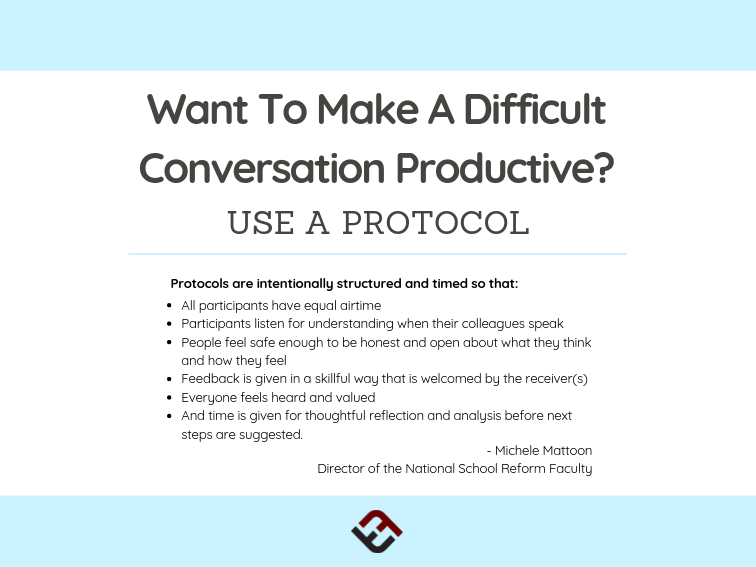
In Order To Make A Difficult Conversation Productive, Use A Protocol
contributed by Michele Mattoon, NSRF Director
Each year, I train scores of educators and professionals to become Critical Friends Group© Coaches, and sometimes I lead shorter workshops around the proper use of protocols, our term for structured conversation tools.
As I take people through their first protocol experience, I watch how they respond to this new way of communicating with their colleagues. Often, when I ask them to reflect upon the experience afterward, at least one person will describe the conversation as ‘unnatural.’
What they usually mean by this is that they feel frustrated by a protocol’s restrictions on when and how they may speak, and/or that they find it extremely difficult and uncomfortable when they are directed to listen carefully in order to truly understand their colleagues before speaking.
When I hear the protocol experience described this way, my typical answer is “Great!” Communicating the way we ‘normally’ do guarantees that we will get the results we ‘normally’ get. This ‘normal’ process works well if you are incredibly well-spoken, self-aware person speaking with other well-spoken, self-aware colleagues, all of whom never get caught up in defensiveness or anger and wanting/needing to be right.
Unfortunately, most of us are not so enlightened or fortunate, especially when the subject of the conversation is provocative and there are strong emotions on all sides. At these times, it can be easy to let our strong feelings take over. When they do, problematic behaviors like these often arise:
- Speaking louder to emphasize our points
- Repeating ourselves
- Interrupting others
- Not sharing ‘airtime’ with people who don’t share our opinions
- Confusing our assumptions with actual facts
- Impulsively using speech that places blame, puts people on the defensive, or makes others feel disrespected or judged
- Listening to others primarily to create counterarguments in our favor
- Or not listening at all because we are too busy contemplating our own brilliant points while others are talking.
Needless to say, these behaviors inhibit rather than support having a productive conversation that moves the participants toward positive outcomes. Luckily, communication tools like NSRF protocols can make even the most difficult conversations productive — the ‘unnatural’ aspects of protocols force our normal impulses and behaviors aside and call for us to act in ways that promote awareness.
Ideally, before difficult conversations take place, all parties would commit to following a protocol that is specifically selected and facilitated by a trained, neutral third party in order to achieve the best possible outcome for that particular situation. Protocols are intentionally structured and timed so that:
- All participants have equal airtime
- Participants listen for understanding when their colleagues speak
- People feel safe enough to be honest and open about what they think and how they feel
- Feedback is given in a skillful way that is welcomed by the receiver(s)
- Everyone feels heard and valued
- And time is given for thoughtful reflection and analysis before next steps are suggested.
Protocols do not guarantee that every problem or conflict will be magically solved with one conversation. However, when followed with fidelity and facilitated with care, protocols can ensure respectful listening as well as open and honest conversations, assuring positive steps forward.